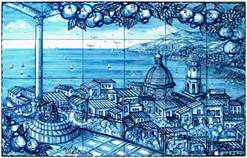Speaker
Dr
Evaldas Maceika
(State scientific research institute Center for Physical Sciences and Technology)
Description
In scientific literature studying migration of radionuclides from water into soil and bottom sediments, the process is described by one-phase models. The main drawback of such models is related to the fact that the radionuclide diffusion coefficient in sediments decreases with time. However, analyses of radionuclide vertical profiles in carbonate bottom sediments as well as results of laboratory experiments show that the process proceeds in two temporal phases. The first- fast migration stage is governed by the light ion transfer. The resulting vertical profile of the radionuclide activity concentration in sediments is exponentially decreasing with depth. The second migration phase is slow. It involves the main significant processes: bioturbation, sedimentation as well as the first order kinetic reactions and radioactive decay.
In the case of accidental appearance of radionuclides in water systems the one-phase model cannot be properly employed to predict the long-term consequences of radionuclide migration into media where they are mostly accumulated- bottom sediments and soil solid phase. Application of the correct model of radionuclide behaviour in the radioactive waste storage environment and in water saturated soils is of great concern as well.
The two-phase mathematical model of the radionuclide vertical migration in the water saturated solids (bottom sediments and soil) and its solution are presented. The model sensitivity analysis revealed the main important parameters affecting the radionuclide migration rates.
This research was funded by a grant (No. MIP-041/2012) from the Research Council of Lithuania.
Author
Dr
Evaldas Maceika
(State scientific research institute Center for Physical Sciences and Technology)
Co-authors
Mr
Andrius Puzas
(State scientific research institute Center for Physical Sciences and Technology)
Dr
Eva Koviazina
(State scientific research institute Center for Physical Sciences and Technology)
Dr
Narciza Spirkauskaite
(State scientific research institute Center for Physical Sciences and Technology)
Dr
Nikolaj Tarasiuk
(State scientific research institute Center for Physical Sciences and Technology)
Dr
Sarunas Buivydas
(State scientific research institute Center for Physical Sciences and Technology)
Dr
Vitold Filistovic
(State scientific research institute Center for Physical Sciences and Technology)

